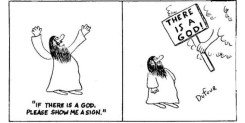Last year I posted two series of posts, one on 12 reasons to believe in God and the other 6 reasons to disbelieve in God?
But I didn’t ever finish the two series off with an assessment of the relative merits of the two sides of the argument. So here, belatedly, is my summary.
Evidence either way
It is fundamental to my thinking that there is evidence for and against the existence of God.
This view isn’t all that common, in my experience. Many strong christians dismiss all arguments and evidence against their belief as simply rebellion against God and culpable disbelief. Many committed atheists believe God-belief is a delusion based on blind faith, with no scientific evidence to support it.
I don’t see it that way. I have never thought that way as a christian. And I know too many honest atheists to think that.
It seems to me that many of the most important things in life can be looked at from different perspectives. Sure, we can feel confident of the laws of gravity and Euclid’s geometry. But once we get to personal relationships, politics, complex ethical questions and worldviews, there are many nuances, conflicting viewpoints and evidence, and the truth can be murky. If the answer was obvious either way, the matter would have been resolved long ago, just like geometry.
That is why I presented reasons both for and against belief in God. We need to consider both sides. Otherwise our conclusions will be self-serving rather than truthful.
Where the balance tips for me
I have concluded that belief in God makes more sense than disbelief. There are several reasons why I come to that conclusion.
More of the world points to God
As I reflect on life and the universe, I just find more things that suggest there is a God than suggest there is not. This is reflected in the fact that, in then end, I found it was worth writing about 12 reasons to believe in God and only 6 to disbelieve.
If I didn’t believe in God many more things about the world and about life would be unexplained.
The arguments for God are stronger and more fundamental
I think we can distinguish between:
- facts which raise doubts and questions about either theism or atheism, without being a real contradiction; and
- fundamental facts which appear to be contradictory to a viewpoint and so are real barriers to continuing in that view.
Contradictions in theism
To me, there is really only one such argument – the problem of evil. The existence of so much pain and suffering is a real barrier to believing in a loving God. Yet even here, as I discussed in Do suffering and evil prove there’s no God?, this strong atheistic argument raises problems for the atheist. The argument really only has traction if we believe that pain and suffering are objectively and truly evil. But atheism cannot (I believe) provide any basis for believing in objective ethics.
The remaining arguments against belief in God seem to me to be reasonable doubts and valid questions to ask, but none of them really bite. None of them raise fundamental questions. There is no logical or factual reason why God couldn’t choose to remain somewhat “hidden” and to not always grant our prayer requests. The issues with science, the Bible and the weirdness of christianity count against some forms of christian belief, maybe, but not against theism and thoughtful christian belief.
Contradictions in atheism
Atheism seems to me, and most people, to entail naturalism. Not only is there no God, but there is no supernatural. And naturalism seems to me to be a fundamental weakness in atheism. Science assumes methodological naturalism because science can only really address natural causes. But when we examine naturalism, it has many difficult, even impossible, consequences:
- Naturalism cannot explain the universe – how it exists at all and how it is so well designed. Every alternative other than creation by God seems to me to be so improbable as to be impossible.
- If naturalism is true, then human beings have no free will, there are no objective ethical truths, we cannot explain consciousness, and our reasoning is physically determined rather than based on logic. But our common human experience tells us otherwise. Atheists say that these things are necessary illusions, but I think if we can’t live as human being without believing in free will, ethics and rationality, then that tells us something very powerful. And, it is worth noting again, we cannot even begin to make an anti-theistic argument from evil without assuming free will, ethics and rationality are real.
- I don’t think we can easily dismiss reported human experiences of God, in healing, visions, mystical experiences and help in daily life. Of course many of them can and should be dismissed, but there are enough that are well documented, and with well-established beneficial outcomes, to challenge our presuppositions.
- The life of Jesus, as defined by secular historians, is also a powerful argument for theism. Of course we can explain it in naturalistic terms, but in light of 1-3, his divinity makes more sense to me than other explanations.
Some of these arguments go the very core of our existence as human beings in this universe. If we cannot explain the universe and human experience, then arguments like God’s hiddenness and even the problem of evil cannot really even get started.
The end of the matter?
I’m aware that other people will see things differently. For some the problem of evil over-rides all other arguments. I can understand that. Suffering is a deeply emotional issue.
And I still have many doubts and questions and uncertainties. But I would have many more doubts, questions and uncertainties if I was an atheist.
So that’s my assessment, and the reasons why I write this blog.
I would be happy to receive (polite) comment in agreement or disagreement.
Posts in these series
12 reasons to believe in God
- Why does the universe exist?
- Was the universe designed, or random?
- Who am ?
- Freedom of choice
- Are some things really right and wrong?
- I think, therefore ……. ?
- The evidence for miraculous healing
- Experiencing God in a deep way?
- Does the historical Jesus reveal God?
- Jesus appears to people – really?
- Finding God in everyday life
- It works (mostly!)
- Conclusion: Why I believe in God
6 reasons to disbelieve in God?
- Do suffering and evil prove there’s no God?
- Is God hiding or just not there?
- Can we believe in God in the scientific age?
- Christianity: too weird to be true!?
- The Bible: impossible to take seriously?
- If there’s a God, why doesn’t he answer our prayers?
Photo Credit: mightyb Flickr via Compfight cc




